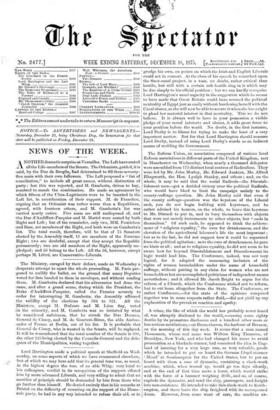The Reform Union, an association composed of various local Reform
associations in different parts of the United Kingdom, met in Manchester on Wednesday, when nearly a thousand delegates were assembled from 173 distinct local centres of Radicalism. They were led by Mr. John Morley, Mr. Edward Jenkins, Mr. Alfred Illingworth, the Hon. Lyulph Stanley, and others ; and, on the whole, it may be said that the social Radicals—the Disestab- lishment men—got a decided victory over the political Radicals, who would have liked to limit the campaign mainly to the county-suffrage question. Mr. John Morley said that even if the county suffrage-question was the keystone of the Liberal arch, you do not begin building with keystones, and he rather advised his hearers, on the whole, to leave this keystone to Mr. Disraeli to put in, and to busy themselves with objects that were not merely instruments to other objects, but " ends in themselves." Of such ends, he appeared to think the achieve- ment of " religious equality," the cure for drunkenness, and the elevation of the agricultural labourer's life the most important ; but as to the last, he did not suggest how it could be separated from the political agitation ; as to the care of drunkenness, he gave no hints at all ; and as to religious equality, be did not seem to be aware how far beyond Disestablishment and Disendowment its logic would lead him. The Conference, indeed, was not very logical, for it adopted the unmeaning inclusion of the rights of women householders under the name of household suffrage, without putting in any claim for women who are not householders but are accomplished politicians of independent means nevertheless ; and it allowed Mr. Jacob Bright to argue for the reform of a Church, which the Conference wished not to reform, but to cut loose altogether from the State. The Conference, or rather Confluence, for the state of the opinions compared together was in some respects rather fluid,—did not yield up any explanation of the prevalent reaction and apathy.






































